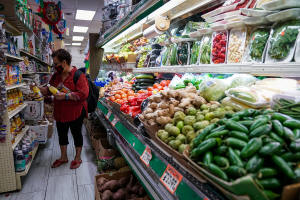The elusive Fed 'soft landing' nears. Why are Americans so mad about the
economy?
 Send a link to a friend
Send a link to a friend
 [September 26, 2023] By
Howard Schneider [September 26, 2023] By
Howard Schneider
WASHINGTON (Reuters) - U.S. Federal Reserve Chair Jerome Powell said
emphatically last week that people "hate inflation, hate it," but he
left another fact unspoken - they also punish the politicians in charge
when prices rise.
The central bank's quest for a "soft landing" of more slowly rising
prices and continued economic growth looks increasingly probable. In
fact, the U.S. may hit a sweet spot just as the 2024 presidential
election campaign crescendos next year.
It's the sort of benign outcome that academic studies and high-ranking
economists had called virtually impossible after inflation hit 40-year
highs in June of 2022. Some warned that millions of workers might need
to be rendered jobless to reduce the pace of price increases in a
flashback to the central banking experience of the 1970s.
Rather than cheering, though, after years of economic turbulence since
the coronavirus pandemic erupted in 2020, Americans grumble, at least if
you ask them about the economy.
More than 40% of U.S. voters who backed Joe Biden in the 2020
presidential election say they think the economy is worse off than it
was then, a Reuters/Ipsos poll published last month found.
The front-runner for the Republican presidential nomination, former
President Donald Trump, faces a string of criminal indictments related
to his attempts to overturn the 2020 election. Still, several recent
polls show him tied with Biden in a hypothetical 2024 matchup.

That's because things on the ground don't feel as good as the positive
inflation trend would indicate. With fast rising prices and the end of
an array of pandemic-era government benefit programs, inflation-adjusted
household income fell last year, and the poverty rate increased.
Borrowing costs also have risen sharply in the past 18 months as the Fed
ratcheted up interest rates to tame the surge in inflation, adding to
consumers' sour mood.
Past presidential elections have often seemed to turn on pocketbook
issues. High inflation and a Fed-induced recession hampered President
Jimmy Carter's 1980 reelection campaign against Republican candidate
Ronald Reagan; President George H. W. Bush was hobbled by rising
unemployment, a spike in prices, and a recession in his 1992 bid for a
second term against Democrat Bill Clinton, the race in which a Clinton
adviser famously framed campaign strategy around "the economy, stupid."
The Biden administration has worked to lower costs by releasing stores
of the country's strategic petroleum stockpile, pushing down health
insurance premiums, negotiating the cost of common prescription drugs,
and trying to end monopolies in meat processing and battling "junk" fees
paid by consumers.
They've also touted hundreds of billions of dollars in infrastructure
investments during Biden's term as increasing the capacity of the U.S.
economy going forward by easing supply chain constraints. Critics say
that spending and the associated deficits may actually be fueling higher
prices.
A Biden adviser said the White House understands that the economy and
inflation are a critical issue, and the campaign has a big media push
planned on "Bidenomics." The adviser added that many voters see threats
to democracy and their rights as vital, too, and the strong performance
of Democrats in the midterm elections last year shows that.
'MORAL INDIGNATION'
Analysts, economists and the media closely track the main inflation
gauge, the U.S. Consumer Price Index, for its monthly window on how much
prices have risen from a month or a year ago.
In the 12 months through August, the CPI accelerated 3.7%, a sharp drop
from its peak of 9.1% in June of 2022.
But that's not what voters care about. Even as the pace of price hikes
recedes, the sticker shock from previous increases remains. Just because
inflation falls, in other words, it doesn't mean prices fall back to
where they were - only that they are growing less quickly.
Anyone in a grocery store is less likely to appreciate that meat,
poultry, fish and eggs are slightly less expensive now than they were at
the start of the year - inflation among those goods was negative for
several months - than to grimace at the fact that those core sources of
protein still cost about 24% more than they did on the eve of the
pandemic in early 2020.

[to top of second column] |

A woman shops for groceries at El Progreso Market in the Mount
Pleasant neighborhood of Washington, D.C., U.S., August 19, 2022.
REUTERS/Sarah Silbiger/File Photo

In a mid-1990s survey, Yale University economics professor and Nobel
Prize winner Robert Shiller found that inflation associated with no
less than "a tone of moral indignation."
"People tell of businesses trying too hard to pursue profits, the
Fed behaving stupidly, people trying to live above their means, or
politicians trying too hard to get reelected," Shiller wrote.
In another telling survey in the summer of 2022, management
consulting firm McKinsey & Company found that the onset of inflation
had promptly doubled the percentage of respondents seen in previous
polls who felt pessimistic about the economy - dwarfing the numbers
seen even at the depths of a pandemic that would go on to kill 1.1
million people in the U.S. and throw the economy into chaos.
"Now that inflation has accelerated to its highest rate in four
decades, the mood has turned darker," the McKinsey study said.
The headline to the American Psychological Association's "Stress in
America 2022" report from October of last year was headlined
"Concerned for the future, beset by inflation."
How could paying more at the grocery store or the gas station
compare with a mass catastrophe like the pandemic?
In the latter case, a multi-trillion-dollar government safety net
had given people a bridge through the initial spike in unemployment
and provided a buffer for them to stay away from jobs until they
regarded the workplace as safe.
There is no similar buffer from higher prices, a stretched family
budget, or an eroding retirement. Inflation is universal and efforts
to combat it with things like price controls or subsidies typically
don't work.
Biden promised this month to get gasoline prices down again, a rash
vow for any president given the limited impact an administration has
on prices at the pump.
The question is how long the inflation scar will last from here,
whether the pace of price increases continues to moderate, and
whether, as the Fed seems to anticipate, the rest of the economy
remains on track.
STILL SPENDING
If it goes according to the central bank's current expectations,
there may even be interest rate cuts thrown into the mix next year,
letting Biden test the premise of whether running on a strong
economy in an environment of easing credit works as well as running
against an economic downturn, financial tightening, and rising
prices.

There's some indication a turn in public sentiment could be in the
making even before that happens. The U.S. Census Bureau's most
recent Household Pulse survey, for the two weeks ending Sept. 4,
showed that while 80% of respondents were still "somewhat" or "very"
concerned about future inflation, the number had fallen from earlier
peaks in every state.
As Powell noted last week, there is a schism between what people say
in surveys and how they behave.
When asked a question, they are sour.
When left alone, they go shopping.

"It's a very hot labor market ... You're starting to see real wages
are now positive by most metrics ... Overall, households are in good
shape," Powell said in his Sept. 20 press conference after the end
of the latest Fed policy meeting. "Surveys are a different thing.
Surveys are showing dissatisfaction. I think a lot of it is people
hate inflation. Hate it. And that causes people to say the economy's
terrible. At the same time they're spending money. Their behavior is
not exactly what you'd expect from the survey."
(Reporting by Howard Schneider; additional reporting by Trevor
Hunnicutt; Editing by Heather Timmons and Paul Simao)
[© 2023 Thomson Reuters. All rights
reserved.]
This material may not be published,
broadcast, rewritten or redistributed.
Thompson Reuters is solely responsible for this content. |